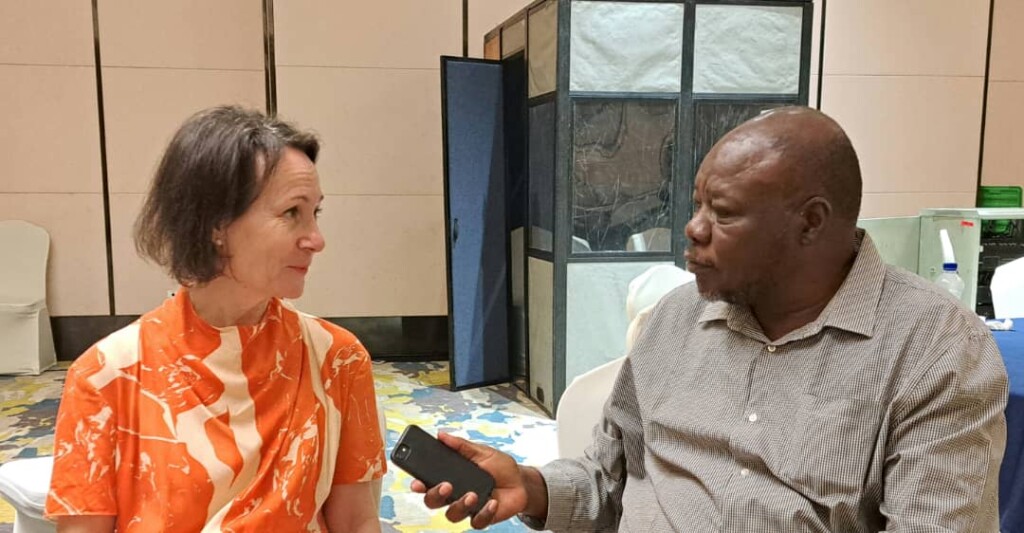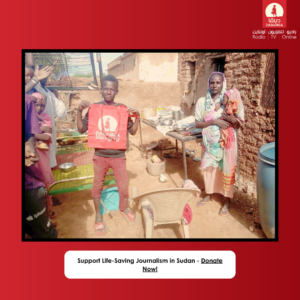Swedish Ambassador to Sudan: ‘EU prepared to impose more sanctions if necessary’

Swedish Ambassador to Sudan, Anna Blok Mazoyer, speaks to Radio Dabanga correspondent Ashraf Abdelaziz on the sidelines of the Sudan Business for Peace Conference workshop in Addis Ababa (Photo: Radio Dabanga)
The European Union (EU), which has already imposed sanctions on six companies that are financing the war in Sudan, is ready to impose more measures if necessary, the Swedish Ambassador to Sudan, Anna Blok Mazoyer, told Radio Dabanga, in an interview in Addis Ababa.
Speaking to Radio Dabanga correspondent Ashraf Abdelaziz on the sidelines of the Sudan Business for Peace Conference workshop, that began in the Ethiopian capital on Tuesday (see below for audio), Ambassador Blok Mazoyer stressed that “the EU is interested in the events taking place in Sudan, has imposed sanctions on six companies working to finance the war, and is ready to sign more sanctions if necessary.”
In earlier comments at the workshop, Block Mazoyer, remarked that sanctions imposed on supporters of the war by the EU “take considerable time, as they require consensus among 27 member states”. Nonetheless, she emphasised EU commitment to addressing the Sudanese war, “akin to its stance on conflicts in Gaza and Ukraine”.
In the interview with Radio Dabanga, Block Mazoyer expressed her regret over the Sudanese government decision not to deliver relief to those affected in areas controlled by the Rapid Support Forces (RSF), pointing out that the cost of delivering aid through Chad [into Darfur] is four times more expensive than sending it through Port Sudan.
“People always look at the events happening around them with close anticipation and anticipation, and for us in Europe, the Russian invasion of Ukraine was a great shock to us, and this is what made our solidarity with those affected by this war great, as my government in Sweden and other governments are making efforts to help Ukraine in particular,” Block Mazoyer says.
“In terms of geography, it Russia is located next to us. Russia is not our enemy, but the way they are acting in the Ukraine war is illegal and contravenes all international law. As for Gaza, it also captured the attention of world public opinion and found a wide resonance as a result of the media’s continuous reporting on the events and the high level of attention, with voices calling for support for both parties; yet we have not forgotten the war in Sudan,” Block Mazoyer assures.
“It is true that the Western media does not cover it sufficiently, but the EU continues to closely monitor what is happening in Sudan, and by virtue of my position as ambassador, I assure you that I and my fellow EU ambassadors are seized on the situation in Sudan every day… we do what we can for peace in Sudan, and we work every day to continue providing humanitarian and development aid to Sudan as much as possible.”
Sanctions: We do not want to punish the entire Sudanese people – Swedish Ambassador to Sudan, Anna Blok Mazoyer
Asked why the EU was quick to impose sanctions, even on the Sudanese, who cooperated with Hamas, its steps not sign strict sanctions on those financiers of the war in Sudan was slow, Block Mazoyer says that “sanctions have been imposed on six companies: Three companies affiliated with the RSF and three companies affiliated with the Sudanese Armed Forces (SAF), which are companies that help finance the war, and we targeted them to show our ability to do so. Other companies could also be included, because financing this senseless war is something that should not happen.”
However, regarding comparing the sanctions imposed on the leaders of Hamas and the Islamists in Sudan, Block Mazoyer explains that the EU has classified Hamas as a terrorist organisation, so it imposes sanctions on its leaders and those who cooperate with it.
“The sanctions imposed on Islamists by Hamas are not related to their ideology, but rather are a result of the violent actions they carry out against innocent people. We look at the actions of individuals and not their ideas,” she says, highlighting that “similar sanctions have been imposed on a few Tunisian leaders, a few Egyptian, Libyan ,and Syrian leaders, and therefore we do not want to punish the entire Sudanese people as was the case in previous sanctions.”
Block Mazoyer acknowledges that the sanctions are not a panacea, but “they send a message from the EU to the warring parties, the companies that help them, and the people who help them with financing so that they can commit human rights violations. These are the ones we want to target… It is true that we started with just a few, but we are ready for more sanctions if it is necessary.”
The Swedish ambassador calls the decision by the Sudan government not to allow delivery of humanitarian aid to those affected in areas controlled by the RSF “shocking”.
She underlines that the aid sent by the EU, or Sweden as a country, or the United Nations, is to help needy people who have fled the conflict. However she points out that “realistically, the best and least expensive way for humanitarian aid to flow to Sudan is through Port Sudan. Delivering aid through Chad is four times more expensive than sending it through Port Sudan, but where we were we were prevented from doing so, we were compelled to route aid through Chad or South Sudan.”
Workshop
As previously reported by Radio Dabanga, participants in the Sudan Business for Peace Conference workshop, that began in Addis Ababa, the capital of Ethiopia last week, addressed the presence of companies, both within Sudan and abroad, actively supporting and perpetuating the ongoing war.
Experts participating in a closed workshop on war corruption in Sudan pointed to the involvement of foreign countries in the Sudan war, “given their vested interests in doing so”. Participants called on the United States of America to exert more pressure on these nations to cease their support for the war, whilst warning against Iranian expansion, and Emirati, Egyptian, Ethiopian, and Chadian presence in the conflict.
Audio: Radio Dabanga interview with Swedish Ambassador to Sudan, Anna Blok Mazoyer in Addis Ababa.











 and then
and then